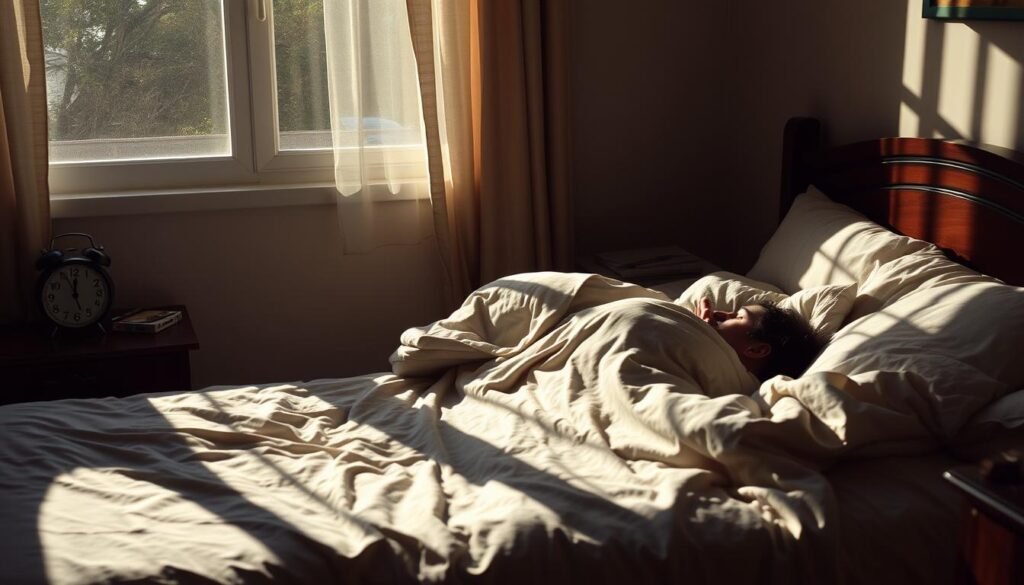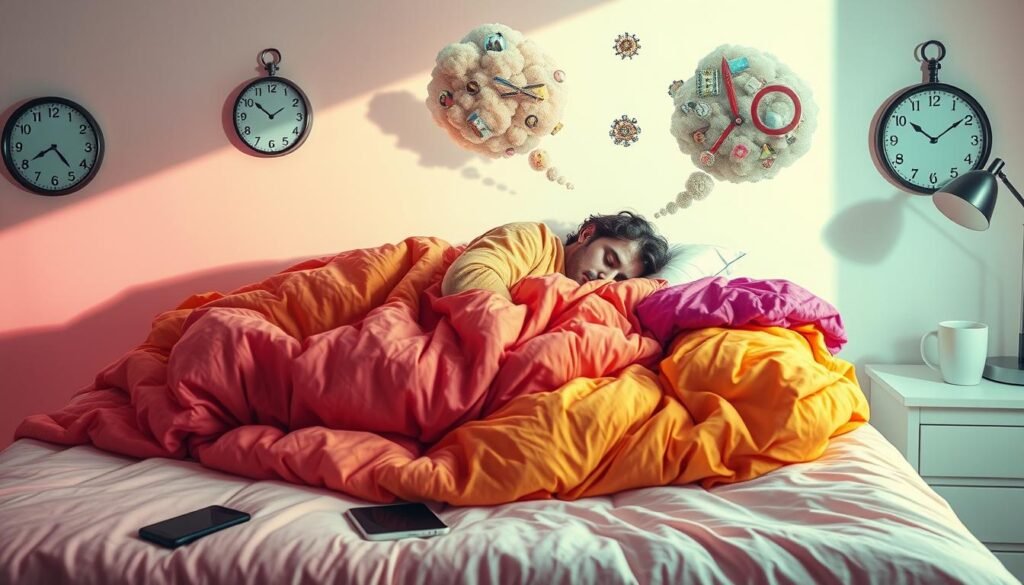We often hear about the importance of getting enough sleep. But what about oversleeping? Is it really a myth? Research shows that sleeping too much can harm our health, proving that oversleeping is not just a myth.
Experts link oversleeping to serious health issues like type 2 diabetes and heart disease. It can also lead to obesity, depression, and headaches. This raises important questions about the effects of oversleeping.
As we explore the science of oversleeping, we’ll look at the evidence. We’ll see how it affects our well-being. We’ll also discuss the right amount of sleep for adults, which is 7-9 hours a night. This will help us understand if oversleeping is truly a myth.
Table of Contents
ToggleKey Takeaways
- Oversleeping is linked to various health problems, including type 2 diabetes and heart disease, which challenges the myth of oversleeping.
- Experts recommend 7-9 hours of sleep per night for healthy adults, debunking oversleeping misconceptions.
- Regularly needing more than 8 or 9 hours of sleep may indicate an underlying sleep or medical issue, related to the concept of is oversleeping a myth?
- Oversleeping can negatively impact immune function, inflammation, and heart health, addressing oversleeping misconceptions.
- Consistently oversleeping may indicate a sleep disorder, mental health disorder, or other underlying health issues, which is often overlooked in the discussion of the myth of oversleeping.
- Appropriate treatment for sleep apnea can reduce oversleeping tendencies, providing a solution to debunking oversleeping.
- Individuals who experience sleep debt may attempt to compensate by oversleeping on subsequent nights, which is a common issue related to the concept of is oversleeping a myth?
Understanding Sleep Basics and the Concept of Oversleeping
Getting enough sleep is key, but what’s enough varies for everyone. To grasp oversleeping, we must first learn about sleep’s different stages. Oversleeping research shows sleep cycles last 70 to 120 minutes each night. These cycles are divided into four stages: Stage 1 (N1), Stage 2 (N2), Stage 3 (N3, or Deep Sleep), and Stage 4 (REM Sleep).
Looking into oversleeping facts, it’s vital to understand individual sleep needs. While some need more sleep, oversleeping truth reveals sleeping over 9 hours a night can harm health. The National Library of Medicine says oversleeping is sleeping more than 9 hours in a day. This can lead to health issues like heart problems and a weaker immune system.
Here are some key points to consider when it comes to sleep and oversleeping:
- Sleep cycles last between 70 and 120 minutes each night
- Total sleep time is divided into four stages: Stage 1 (N1), Stage 2 (N2), Stage 3 (N3, or Deep Sleep), and Stage 4 (REM Sleep)
- Sleeping more than 9 hours per night can have negative effects on our health
Understanding sleep basics and oversleeping is key to appreciating the right sleep amount each night. As we dive deeper into oversleeping, we’ll look at the latest oversleeping research. We aim to clear up the oversleeping truth and its health impacts.
The Science Behind “Too Much Sleep”
We explore the oversleeping science to grasp its health impacts. Studies show that oversleeping effects can harm us, raising the risk of chronic diseases. The National Sleep Foundation advises 7–9 hours of sleep for adults aged 26–64 and 7–8 hours for seniors. Sleeping too much can lead to oversleeping health risks, such as obesity, diabetes, and heart disease.
Some key findings on sleep duration include:
- Cognitive performance is significantly impaired in individuals who sleep for both less than 7 hours and more than 8 hours.
- Older adults are more likely to have shorter sleep durations and are impacted more by sleep deprivation.
- Those sleeping 4 hours or less each night perform as if they were almost 8 years older than their actual age.
A “J-shaped” relationship exists between sleep duration and mortality rates. This means both too much and too little sleep can be harmful. We need to understand the oversleeping science to keep our sleep balanced. This helps us avoid oversleeping effects and oversleeping health risks.
Is Oversleeping a Myth? Examining the Evidence
We will look into the facts about oversleeping and its health effects. Studies show that too much sleep can raise the risk of depression and anxiety. The National Sleep Foundation says adults should sleep between 7 to 9 hours.
Some research shows that oversleeping vs. sleep deprivation can harm our health in similar ways. For example, older adults sleeping over 10 hours often feel worse mentally than those sleeping the right amount. Oversleeping and productivity are also linked, as too much sleep can lower our work and thinking skills.
The reasons for oversleeping causes are varied and complex. Lifestyle, sleep disorders, and medical conditions can play a part. To understand sleep’s impact on health, let’s look at some numbers:
- About 15% of people with depression sleep too much.
- A study found that sleeping more than 9 hours raises CRP levels, which are linked to inflammation.
- People sleeping long hours are more likely to have ongoing depression or anxiety than those sleeping normally.
In summary, the evidence shows that oversleeping can harm our health. It can increase depression and anxiety risks, lower productivity, and raise inflammation levels.
| Sleep Duration | Effects on Health |
|---|---|
| 7-9 hours | Recommended range for adults, associated with lowest mortality and morbidity rates |
| More than 9 hours | Excessive sleep, linked to increased risk of depression, anxiety, and inflammation |
Physical Health Effects of Extended Sleep Patterns
We often focus on the importance of getting enough sleep, but oversleeping can have negative consequences on our physical health. Research suggests that sleeping more than 9 hours per night can lead to an increased risk of obesity, diabetes, and heart disease.
Some of the oversleeping consequences include headaches, difficulty concentrating, and increased inflammation. Oversleeping habits can also lead to memory issues, puffy eyes, anxiety, and depression. It is essential to maintain a healthy sleep schedule to avoid these risks.
A study by the Centers for Disease Control and Prevention found that oversleeping can lead to an increased risk of chronic diseases. The following are some possible health effects of extended sleep patterns:
- Increased risk of obesity and diabetes
- Higher risk of heart disease
- Headaches and difficulty concentrating
- Memory issues and increased inflammation

It is important to be aware of the oversleeping consequences and take steps to maintain a healthy sleep schedule. By doing so, we can reduce the risk of chronic diseases and improve our overall physical health.
| Health Effect | Description |
|---|---|
| Obesity | Increased risk of obesity due to lack of physical activity |
| Diabetes | Higher risk of developing diabetes due to insulin resistance |
| Heart Disease | Increased risk of heart disease due to high blood pressure and cholesterol |
The Connection Between Mental Health and Excessive Sleep
Many think oversleeping is harmless, but it can harm our mental health. It can lead to depression and anxiety. Studies show over 300 million people worldwide have depression, with 75% also having insomnia.
Sleeping in on weekends might seem like a good idea. But, it can mess up our sleep patterns. This can cause us to feel very sleepy during the day and sleep too much.
Depression and Oversleeping
People with depression often sleep too much during the day. This creates a cycle where they sleep more during the day and less at night. It makes their mental health problems worse.
Anxiety-Related Sleep Patterns
Anxiety affects about 20% of adults and 25% of teenagers in the U.S. Poor sleep can make anxiety worse in people at risk. Knowing the truth about oversleeping helps us fight it and improve our mental health.
Common Causes of Oversleeping Behavior
We often hear about the importance of getting enough sleep. But what about oversleeping? Is it a myth or a real issue that affects our health? Let’s look at the common causes of oversleeping behavior.
Research shows that oversleeping can be caused by many factors. These include sleep disorders, mental health issues, and lifestyle factors. For example, sleep apnea and restless leg syndrome can disrupt our sleep patterns. Also, depression and anxiety can lead to oversleeping. To improve our sleep quality, we need to address these issues.
Here are some common causes of oversleeping behavior:
- Sleep disorders, such as sleep apnea and restless leg syndrome
- Mental health issues, such as depression and anxiety
- Lifestyle factors, such as irregular sleep schedules and lack of physical activity
Understanding the causes of oversleeping is key to addressing it. By identifying these factors, we can improve our sleep quality and health. So, is oversleeping a myth? Not exactly. While it’s not always a serious issue, it can harm our health if ignored.
To summarize, oversleeping is a complex issue with various causes. By understanding these causes and addressing them, we can enhance our sleep quality and health. Remember, it’s not just about sleeping too much. It’s also about maintaining a healthy lifestyle and tackling underlying issues.
| Cause of Oversleeping | Description |
|---|---|
| Sleep Disorders | Conditions like sleep apnea and restless leg syndrome can disrupt sleep patterns |
| Mental Health Issues | Depression and anxiety can contribute to oversleeping |
| Lifestyle Factors | Irregular sleep schedules and lack of physical activity can lead to oversleeping |
Lifestyle Factors That Influence Sleep Duration
Our lifestyle greatly affects our sleep patterns. Oversleeping research shows several key factors that lead to too much sleep. Work schedules and our environment can mess with our natural sleep cycle. This can cause fatigue, headaches, and mood swings.
Some lifestyle factors that can affect how long we sleep include:
- Work schedules: Irregular hours, night shifts, and long commutes can mess with sleep.
- Environmental influences: Noise, light, and temperature can impact sleep quality.
- Digital device impact: Screen time before bed can lower melatonin levels, making it hard to sleep.
To fight the oversleeping effects of these factors, we need to set a regular sleep schedule. We should also make our sleep space comfortable and avoid screens before bed. These steps can help us sleep better and lower the chance of oversleeping effects.
| Lifestyle Factor | Sleep Duration Impact |
|---|---|
| Regular work schedule | Improves sleep quality and duration |
| Irregular work schedule | Disrupts sleep patterns and reduces sleep quality |
| Screen time before bed | Suppresses melatonin production and reduces sleep quality |
Breaking the Oversleeping Cycle: Practical Solutions
Oversleeping can harm our health, both physically and mentally. It’s key to find ways to stop it. To do this, we need to set a regular sleep schedule. This helps our body’s clock and improves sleep quality.
Changing our sleep environment is also important. A cool, dark, quiet bedroom helps us sleep better. Also, avoiding screens before bed can prevent oversleeping and its effects like tiredness and low productivity.
Behavioral Modifications for Healthy Sleep
Changing our habits can also help. Avoiding caffeine and heavy meals before bed is a good start. Regular exercise and relaxation techniques like meditation can also improve sleep. These steps help us move towards better sleep and health.

Changing our sleep habits takes time and effort. Small changes can lead to better sleep over time. If sleep issues persist, seeing a healthcare professional is a good idea for advice and support.
| Sleep Duration | Health Risks |
|---|---|
| Less than 6 hours | Increased risk of chronic diseases, such as diabetes and cardiovascular disease |
| 6-8 hours | Low risk of chronic diseases, optimal sleep duration for most adults |
| More than 8 hours | Increased risk of oversleeping consequences, such as daytime fatigue and decreased productivity |
When to Seek Professional Help for Sleep Issues
We often hear about the importance of getting enough sleep, but what about oversleeping? Oversleeping can have serious health consequences. If your sleep habits are worrying you, it’s time to get help. The American Academy of Sleep Medicine says to see a doctor if oversleeping habits are impacting your daily life.
So, how do you know if you’re oversleeping? You might feel tired even after sleeping a lot, or you could be really sleepy during the day. You might also have headaches or mood swings. If you’re experiencing these, it’s time to seek help. Sleep myths tell us sleeping more is always good, but it’s not true. Sleeping more than 9 hours can lead to health problems like heart disease and diabetes.
It’s important to tackle oversleeping habits early. Professional help can help you understand and fix your sleep issues. Don’t let sleep myths control your sleep. Take charge of your health and get help if you need it. Remember, your health is more important than the risks of oversleeping.
Some key signs you should seek professional help for sleep issues include:
- Prolonged sleep duration that interferes with daily activities
- Excessive daytime sleepiness and fatigue
- Headaches and mood swings
- Difficulty concentrating and poor memory retention
If you’re experiencing any of these symptoms, don’t wait to see a healthcare professional. They can find out why you’re oversleeping and help you sleep better.
Conclusion: Finding Your Optimal Sleep Balance
The truth about oversleeping is more complex than it seems. While too much sleep can have downsides, finding your balance is key. The National Sleep Foundation says most adults need 7-9 hours of sleep each night to be at their best.
Understanding sleep science and the effects of too much sleep helps us develop good habits. This might mean changing our work hours, avoiding screens before bed, or trying relaxation techniques. If you’re worried about oversleeping, talking to a sleep specialist can help a lot.
The aim is to get the right amount of sleep to feel refreshed and ready to go. By debunking oversleeping myths and following sleep science, we can improve our health and reach our full capacity. Remember, what works for someone else might not work for you. So, be open to trying different things until you find what works best for you.
FAQ
What is the myth surrounding oversleeping?
Many think oversleeping is harmless. But research shows it can harm our health a lot.
What constitutes normal sleep duration?
Adults should sleep 7-9 hours each night, says the National Library of Medicine. Sleeping more than 9 hours is oversleeping.
What are the health risks of oversleeping?
Oversleeping can raise the risk of diseases like obesity and diabetes, the Sleep Foundation warns. It can also hurt our mental health, leading to depression and anxiety.
What does the research say about oversleeping?
Studies show long sleep can harm our health. The National Institute of Mental Health says it can lead to depression and anxiety.
How does oversleeping affect our physical health?
The Centers for Disease Control and Prevention say it can lead to diseases like obesity and diabetes. Keeping a healthy sleep schedule is key for our health.
What is the connection between oversleeping and mental health?
The National Alliance on Mental Illness says oversleeping can increase mental health risks, like depression and anxiety. It can also affect our thinking.
What are the common causes of oversleeping behavior?
Oversleeping can stem from sleep disorders, mental health issues, and lifestyle, the American Academy of Sleep Medicine explains. Fixing these causes is vital for better sleep.
How do lifestyle factors influence sleep duration?
The National Sleep Foundation says work schedules, environment, and digital use can mess with our sleep. This can lead to oversleeping.
How can we break the oversleeping cycle?
The Mayo Clinic suggests a regular sleep schedule, a calming bedtime routine, and adjusting our environment. These steps can improve our sleep and stop oversleeping.
When should one seek professional help for sleep issues?
The American Academy of Sleep Medicine advises getting help if oversleeping interferes with daily life. A healthcare professional can offer tailored advice for sleep problems.

Join 30,000+ subscribers for exclusive access to our Relaxing tips!



Pingback: Which Is The Top Class Hospital In The World? Global Healthc
Pingback: How Many Cases Of HMPV Are There In India? Get The Facts On.
Pingback: What Is Remission In Medical Terms?
Pingback: Does Sleeping With Someone You Love Make You Fall Asleep Faster?
Pingback: How To Catch Someone Fake Sleeping?
Pingback: How Can I Relax My Brain Fast?
Pingback: How To Calm My Mind From Overthinking?
Pingback: How Do You Calm Your Mind From Overthinking Quotes?
Pingback: Why Is Santa Clara County So Rich? Why Is Santa Clara County
Pingback: What Are Attractive Eyes In Men? What Are Attractive Eyes In
Pingback: Why Am I An Overthinker? Why Am I An Overthinker? Why Am I A